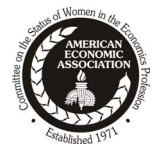Marina Halac awarded Elaine Bennett Research Prize

Marina Halac awarded Elaine Bennett Research Prize
Wednesday 2 Nov 2016Warwick Economics Associate Professor, Marina Halac, has been awarded this year's prize for her outstanding contributions as a young woman in the economics profession.
Professor Halac will formally accept the prize at the Business Meeting and Award Ceremony of the American Economic Association (AEA) Committee on the Status of Women in the Economics Profession (CSWEP), on 7 January 2017 in Chicago.
The Elaine Bennett Research Prize is given in memory of Elaine Bennett, who made significant contributions to economic theory and experimental economics during her short professional career, and who mentorerd many women economists at the start of their careers. The prize was established in 1998 and recognises and honours outstanding research in any field of economics by women not more than seven years beyond their PhD.
 Marina received her PhD in Economics from the University of California, Berkeley in 2009 and currently serves on the editorial boards of two journals. The AEA described her work as 'exemplary', having five papers in top five journals. Her work is well-cited and influential and she has been described as an "award-winning teacher, a noted provider of public goods, and a spectacular colleague, who is much in demand as a speaker at seminars and conferences".
Marina received her PhD in Economics from the University of California, Berkeley in 2009 and currently serves on the editorial boards of two journals. The AEA described her work as 'exemplary', having five papers in top five journals. Her work is well-cited and influential and she has been described as an "award-winning teacher, a noted provider of public goods, and a spectacular colleague, who is much in demand as a speaker at seminars and conferences".
Marina was recognised for her impressive contributions to microeconomics theory, and to our understanding of dynamic incentives and agency problems. Her research in contract theory and game theory focusses on how incentives are shaped by the information environment. She has developed theoretical models to study issues such as the structure and dynamics of employment relationships, the problem of how to motivate experimentation and innovation, and the design of fiscal rules to constrain government spending.

This is a huge honour for me, especially to be joining the outstanding group of women that received this prize in the past.
Previous winners of the prize are: Emi Nakamura (Columbia University), Anna Mikusheva (MIT), Erica Field (Duke University), Amy Finkelstein (MIT), Monika Piazzesi (Stanford University), Marianne Bertrand (University of Chicago), Esther Duflo (MIT), Susan Athey (Stanford University) and Judith Chevalier (Yale University).

